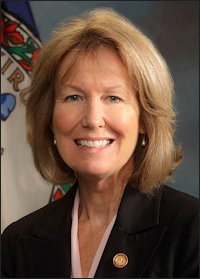by James A. Bacon
Bacon’s Rebellion predicted that the change of political power in the General Assembly from red to blue would bring a raft of proposals for tax increases and revenue enhancements.
Because the General Fund is expected to see healthy revenue growth in the next biennial budget, I speculated that the Northam administration and its legislative allies would be restrained in their quest for new money, most likely pushing for sources that were either too opaque to understand (such as changes to tax deductions in response to the federal tax law) or too fragmented and obscure for anyone to notice. But it looks like I was wrong (hardly for the first time). According to WTOP, Secretary of Transportation Shannon Valentine suggested yesterday that the state could raise gas taxes next year.
Without a change to increase the gas tax or some other transportation funding source, the administration projects a decline in funding for road construction and other projects. In a development that takes absolutely no one by surprise, it turns out that fuel-efficiency improvements in Virginia’s automobile fleet are cutting into gasoline tax revenues.
“Virginia’s transportation [funding] system is simply not sustainable the way we are going,” Valentine told a Springfield gathering of Northern Virginia local and state elected officials.
The gas tax in Northern Virginia is around 22 cents, the 12th lowest of any state. State transportation officials have been examining funding options for more than a year. The funding issue is particularly acute in Northern Virginia, where the state diverted $100 million from road projects to the decrepit and mal-administered Washington Metro system.
The good news here is that transportation officials are finally giving serious thought to a mileage-based tax — something that Bacon’s Rebellion has been advocating for more than a decade.
“The consensus seems to be that over the next 10-15 years, there will most likely be a different way of raising major transportation revenues, whether it’s from a mileage based user fee, vehicle miles traveled, there will be some different form. That is a longer term perspective,” Valentine said.
At the behest of the McDonnell administration several years back, the General Assembly enacted a restructuring of transportation taxes designed to diversify funding sources and increase revenue. I predicted then that legislators would be back in a few years for more.
The fundamental flaw of Virginia’s transportation funding system, which relies heavily on the sales tax and vehicle-sales taxes, is that it is no longer a user-pays system. There is only a partial relationship between how much people drive and how much they pay in taxes for the maintenance of roads, highways, bridges, and transit systems. In other words, the tax system subsidizes people to drive more. There is a widespread sentiment that “someone else” should pay for peoples’ transportation choices, so taxes are based not on rational economic principles but whatever jury-rigged patchwork of taxes politicians think they can cobble into place.
Getting the transportation tax structure right won’t magically solve Northern Virginia’s (or anyone else’s) traffic congestion, which has many causes ranging from dysfunctional land use patterns to an increase in vehicle miles traveled due to economic prosperity. But transportation tax reform would constitute a critical step in the right direction. Rather than expend its political capital on a stopgap gas increase, the Northam administration needs to undertake a top-to-bottom overhaul of the transportation funding system that includes mileage-based taxes and other user-pays mechanisms.



